#Hard to be a God
Text

Hard To Be a God (Chapter 4) literally be like
73 notes
·
View notes
Text
Pacifism in “Hard to Be a God”
[Minor spoilers for the book - discussion of overarching themes with a few minor plot points as examples. There’ll be another warning for MAJOR SPOILERS hidden under “Keep reading”, just before the conclusion.]
(All quotes are from the 1973 translation by Wendayne Ackerman.)
One thing I adore about “Hard to Be a God” is that its protagonist, Anton, is a genuinely nuanced, thought-provoking depiction of a pacifist character.
Some media with this kind of protagonist falls into the trap of implying that the hero has some sort of innate kindness or softness to them. And because they are, individually, “such a compassionate person”, they can do the whole enlightened “forgive and forget, love thy enemy, everyone can be redeemed” shtick. The writer implicitly rewards this “kind nature” by giving the hero overpowered abilities which vindicate their beliefs, and let them continue displaying their kindness (see: Naruto, Steven Universe).
In “Hard to Be a God”, this is inverted. The main reason Anton can resolve fights without bloodshed is because:
A) He was raised by a much more advanced civilisation which imparted onto him their humanistic philosophy. His job literally demands him to be a passive observer who avoids conflict.
B) He has access to modern combat techniques and technology (extra-durable chainmail, fast-acting medicine, a helicopter and the ability to generate gold) which give him a significant advantage (both in direct confrontations and in negotiation).
C) [speculation] Other Noon Universe novels such as “The Inhabited Island” and “The Waves Extinguish the Wind” suggest that Earth’s scouts are genetically modified, giving them greater strength and survivability (though I’m not sure whether this is the case in “Hard to Be a God”, as it takes place much earlier in the timeline).
Anton’s privilege and power are not implied to be a reward for his goodness; it’s the opposite. The fact that he has privilege and power is what gives him the opportunity to be good. This is explicitly drawn attention to when he says things like:
“Remember that they do not know what they are doing; and that they are almost all free of guilt. And that is why you must have the patience of Job, patience, patience [...]”
The general doctrine of Earth’s scouts is not to judge the locals’ moral depravity, because the latter weren’t brought up in the same favourable social conditions as the former.
But ok, even with the deck stacked so heavily in Anton’s favour, he still struggles to be a pacifist. After spending so much time in a world that he sees as backwards - full of filthy brutes and meek, complicit peasants - he has to repress his contempt for these people. He has to manage his emotions, snapping himself out of anger fits:
"And I almost tore them to pieces, he suddenly realized. If they hadn’t run inside I would have killed them! He remembered the bet he had recently made, how he had taken a dummy clad in a double Soanian suit of armor and split it from head to toe with his sword—cold shivers ran down his back at the thought. They might now be lying here in a pool of their own blood, like stuck pigs, and he would be standing here, sword in hand, not knowing what to do … A fine god you are! You’ve become a beast …”
And here’s another important aspect of this: he is deeply ambivalent about this “no killing” rule. On one hand, he takes it as a moral imperative, and is revolted at the thought that he’d be capable of such savagery. On the other hand, he is angry at his own impotence. He doesn’t see his pacifism as bravery, but as passivity - a cowardly refusal to take decisive action when it is desperately needed.
After all, just being an individual saint is not enough to fix a rotten society. What good is Anton’s pacifism if everyone else is gleefully murdering each other? He can’t be everywhere at once, saving people and resolving conflicts diplomatically.
What Anton really wants is to overthrow Arkanar’s cruel leaders; he often fantasizes about staging a full-blown revolution. It’s only his pragmatism that keeps him in check. He reasons that, with how society is structured there, killing a dictator would just create a power vacuum which competing factions would try to fill by slaughtering each other and whoever else happens to be in the way, Anton included.
But, most importantly, Anton is not rewarded for his pacifism. It doesn’t make him feel good - the opposite, it makes him miserable. Nobody (outside of a very small circle of his closest friends) is “inspired by” or respects his morals. They see them as a weird idiosyncrasy which handicaps him.
[MAJOR SPOILERS FOR THE ENDING FROM HERE ON, WATCH OUT!]
And in the end, after losing Kira, the person closest to him in all of Arkanar, he can no longer restrain himself. He goes on a rampage, and is punished for it - he accomplishes nothing, and his superiors immediately withdraw him from the mission. Back at home, when his old friend, Anka, hears of his exploits, she starts to fear him. The final lines of the novel are heart-breaking:
“'Anka,' he said tenderly. 'Anka, my little friend …'
He held his long arms out to her. Timidly she leaned forward, then quickly jumped back a step. On his fingers …
But it was not blood, only the stain of strawberries.“
The implication is clear. Anton has been tainted. He has shown to be capable of incredible cruelty and, no matter how justifiably angry he felt at the time, the people he killed are a permanent stain on his conscience. Metaphorically, the blood is still on his hands.
In this assessment, pacifism and goodness are not exceptional qualities (at least by the standards of futuristic space communists). They’re an expected baseline. Losing your self-restraint and killing, even in extreme circumstances, is a failure.
And I mean, it makes sense. If you have the power to avoid causing bloodshed, it seems like a given that you should use it. Nobody is framed as “heroic” for keeping to this basic standard.
To me, this was so refreshing about about “Hard to Be a God”. It ticks off some of the same tropes as other pacifist protagonists (overpowered abilities and exceptional moral purity relative to their environment) but with none of the aggrandisement and hero worship. Instead of being celebrated and vindicated for doing the right thing, Anton’s only rewards are agonising moral dilemmas and the constant fear that his passivity is enabling things to get worse.
The crucial takeaway is this: PACIFISM IS HARD. Helping people in times of crisis is hard. Making society better is hard. You will have to get your hands dirty, make personal sacrifices, compromise yourself. You won’t feel all fine and dandy as you preach your pacifism from a place of comfort and moral superiority. It really takes a bit of a masochistic, martyr mentality to get anywhere with it.
(Side note: This is only loosely related, but another character that embodies this ideal is Dr. Rieux from “The Plague” by Albert Camus. He loses almost everything while working tirelessly to help his patients, but is not celebrated as a hero. He himself doesn’t view his actions as “heroic”, but simply as “common decency”.)
I think more optimistic stories about pacifism are afraid of this idea. They want to encourage kindness by framing it as simple and uncontroversial - not effortless per-se, but not too challenging either. And they also aggrandise it by framing kind individuals as exceptionally wonderful.
And I don’t know, this irks me. Aren’t we setting the bar very low for humanity, if just being a decent person is so praise-worthy? Isn’t it cynical and contradictory to imply that we’ll be rewarded for our “selflessness” with admiration, and our actions will be vindicated by success? Doesn’t it inflate expectations and set people up for disappointment when we portray kindness as easy, flowing naturally from some innate “good nature” within us?
I know, I’m rambling at this point. But that’s kind of why I love sci-fi - it thrives in this ambiguity and existential dread. It doesn’t give me reassuring narratives about heroism, but asks hard questions and trails off with no satisfying conclusion.
God, this book is so good. The Strugatskys are so good.
I really need to finish that Roadside Picnic essay.
(Huge thanks to Wendayne Ackerman and later Olena Bormashenko for translating the book into English, Irena Piotrowska, into Polish, and Simeon Vladimirov, into Bulgarian.)
41 notes
·
View notes
Text
Hard to be a god

Title: Hard to Be a God
Author: Arkady and Boris Strugatsky
Genre: Sci-fi/medival
Overall rating : ⭐⭐⭐⭐
"Hard to Be a God" is a masterpiece of science fiction that plunges readers into a world both familiar and utterly alien. Penned by the renowned Strugatsky brothers, Arkady and Boris, this novel challenges perceptions, probes the depths of human nature, and creates a vividly immersive experience that lingers long after the final page.
Set on the planet Arkanar, which resembles Earth in the midst of its medieval period, the story follows Anton, an observer from a highly advanced civilization sent to study and guide the less developed society. Disguised as Don Rumata, a nobleman, Anton navigates the brutal and chaotic world of Arkanar, torn apart by ignorance, violence, and superstition.
What makes "Hard to Be a God" exceptional is its exploration of cultural relativism and moral ambiguity. As Anton struggles to fulfill his mission without intervening directly in Arkanar's affairs, he grapples with the ethical dilemmas inherent in his role. The Strugatsky brothers deftly depict the clash between progress and stagnation, civilization and barbarism, leaving readers questioning the nature of progress and the responsibilities of those with knowledge and power.
The novel is richly atmospheric, immersing readers in the grimy streets, dank taverns, and oppressive castles of Arkanar. The Strugatskys' skillful world-building breathes life into this harsh and unforgiving landscape, populated by vivid characters whose motivations and actions drive the narrative forward.
Moreover, "Hard to Be a God" is not merely a tale of otherworldly adventure; it is a profound meditation on the human condition. Through Anton's experiences, the novel explores themes of identity, empathy, and the relentless march of history. As Anton witnesses the suffering and cruelty around him, he grapples with his own humanity and the limitations of his role as an observer.
In conclusion, "Hard to Be a God" stands as a towering achievement in the realm of science fiction literature. With its thought-provoking narrative, intricate world-building, and philosophical depth, it transcends the genre to offer a timeless exploration of the human condition. Whether you're a fan of speculative fiction or simply crave a compelling and intellectually stimulating read, this novel is not to be missed.
This is not a book I would recommend if you are not familiar with Russian books, it is not an easy read. It is a type of book that is written with the idea that you already know what is happening.
Overall, I'd give it 4/5 stars
#book review#bookworm#reading#reading community#bookblr#bookish#russian literature#strugatsky brothers#hard to be a god
4 notes
·
View notes
Text
"Fear" by Fayetteville, Arkansas-based dark electronic act Damien Hearse off of 2023 release Hard to Be a God
#dark electronic#ebm#goth electronic#cybergoth#Damien Hearse#Fear#Hard to Be a God#music#first share#2023#Fayetteville Arkansas#Arkansas goth#2020s goth#Bandcamp
12 notes
·
View notes
Text
tshirt that reads “I went to arkanar and they let me live”
12 notes
·
View notes
Text
Mass-market Monday | Arkadi & Boris Strugatski's Hard to Be a God
Hard to Be a God, Arkadi & Boris Strugatski. Translation by Wendayne Ackerman. Daw Books, first edition, first printing (1973). Cover art by Kelly Freas. 205 pages.
Like many anglophones, I first sought out the Brothers Strugatsky–which I will continue to spell with a final –y here, in line with the spelling variation I’ve used on this blog for years now, while also above conceding this 1973…
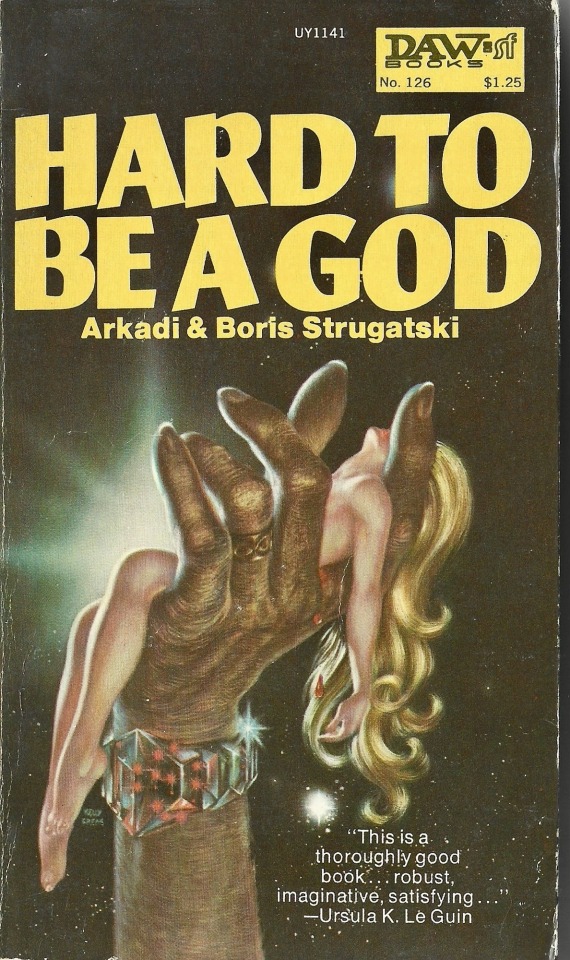
View On WordPress
#Alexei German#Covers#Hard to be a god#Kelly Freas#Mass-Market Monday#Olena Bormashenko#riffs#Sci-Fi#The Strugatsky brothers#Wendayne Ackerman
5 notes
·
View notes
Quote
We absolutely had to know what would "soothe our souls" – what would be the ending of the planned work, the final landmark in the direction of which we were supposed to be dragging the plotline.
Boris Strugatsky on writing Hard to Be a God
7 notes
·
View notes
Text
So, some scattered and more serious thoughts on Hard To Be A God: (I am aware that there are other books set in the same universe, but am taking this as a stand-alone work for now)
-The rank-and-file Gray soldiers are associated with the shopkeeper class over and over, which matches the real-world history of fascist sympathies among the petit-bourgeoisie, but also reflects the nobles brushing off their own complicity in this
-We see very little of Earth, and have no idea if this communist utopia is truly all it’s cracked up to be, or how much of the world it spans, or if they have any track record of successfully improving other planets; but we do know is that their model of history is overdetermined enough to be helpless against things like fascism appearing “ahead of schedule,” so it comes off to me as a critique of an orthodox Marxist view of historical cycles
-Don Rumata compares the Grays to Nazis a few times, but never to Stalinists, and the Doylist part of me gets that the Strugatskys couldn’t have done that at the time, but in-universe it also feels like he’s willfully neglecting something very relevant in the history of his own culture specifically
-…However, while this novel is very clearly the product of growing up under Stalinism, reading it as exclusively about that feels like missing the point and stifling it; like Darkness at Noon, the absence of the word “Stalin” reminds you that these dynamics are not unique to his regime
-I need to reread The Left Hand of Darkness and put these books in conversation
4 notes
·
View notes
Text
I read some dialogue form Zultanek and I want to post it here for you all to enjoy because everything he says and does is, ahem,Solid Gold.
But then i'd just have a post where it's everything he's said in the book and that's no good.
So far, The twice-Dead King: Reign is proving to be a much better story than Ruin, which was a whole book of setup. That's fine! I'm very much guilty of that with The Corpse & the Spider but I'm not sure you lose out on that much if you were to just pickup Reign. Even if it's just to hang out with Zultanekh.
"From whom has the Dynast of Ithakas learned to pace with such impatience?" queried Zultanekh in a tone of mock awe, prompting a rumble of irritation from Oltyx. A hard-scry projection of the casket-broad prince stood casually beside his throne, where it had clearly been watching him for some time, and strode towards him now. "A master of the art, clearly. It is a good habit for Scions, waiting. But is it a worthy pastime for Kings? Zultanekh thinks not."
"What else can I do, copperclad?" snapped Oltyx, in no mood for the giant's games.
"Has it occured to you, Oltyx King, that a Dynast may do whatever he wishes to do?"
"What in the name of the Triarch do you mean, Zultankeh?"
"What do you wish to do, Oltyx?"
"I wish to fight!" shouted the Dynast of Ithikas, oculars flaring with indignance, and Zultanekh roared approvingly.
"Now he understands! So, Dynast of Ithikas, what are you waiting for?"
#Oltyx#Zultanekh#If you enjoyed Zultanekh please go and read#Hard to be a God#by the Strugatsky brothers#Baron Pampa is a flesh and blood Zultanekh I promise you
3 notes
·
View notes
Text


I have a type,
and it's gods that cry themselves to sleep every night because of their paralyzing sense of powerlessness.
#here's to me trying to draw more than last year *clink*🥂 first art of the year#here's also to my art getting hornier with each passing year *clink*🥂#tears and no tears variant cuz I liked the one without them also#don rumata#hard to be a god#strugatsky brothers#my fan art
36 notes
·
View notes
Photo




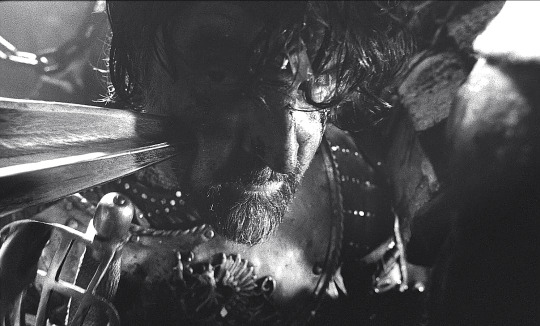
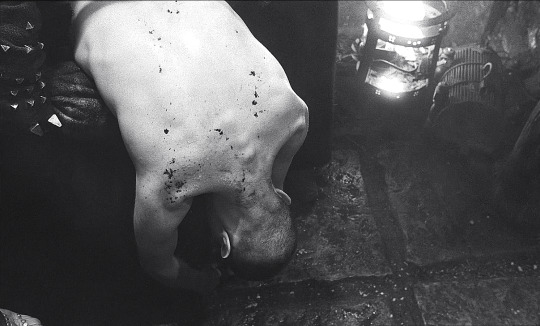
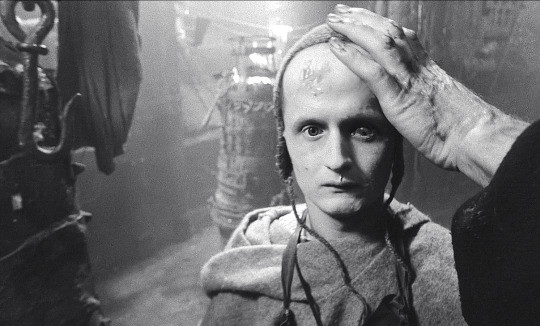

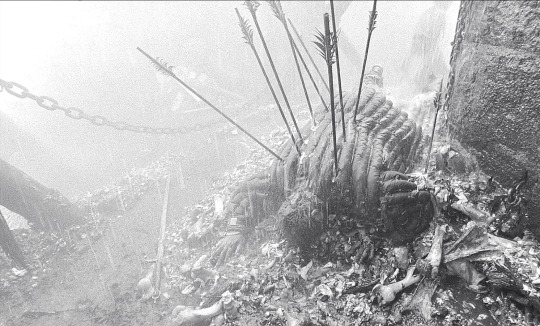
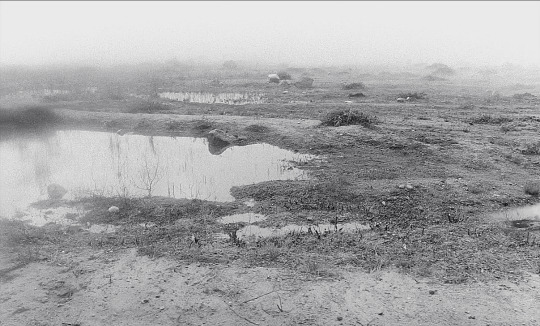
Hard to Be a God, Aleksey German, 2013
8 notes
·
View notes
Text

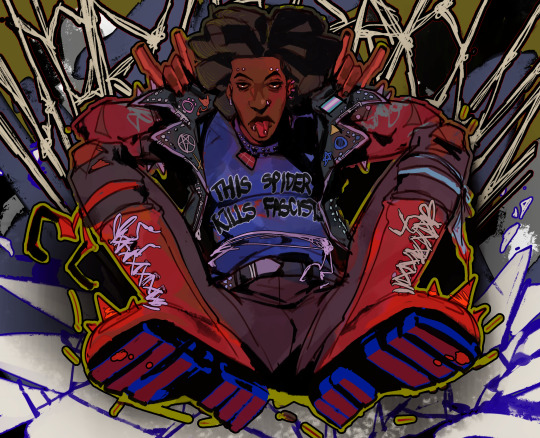
hobie motherfuckin' brown!!!!!!
#i am so normal about hobie brown (lie)#what the hell has this movie done to me#i have taken art drugs#cant. stop. drawing him. oh my god#its hard to tell but the webbing behind him spells out his name#my anticapitalist king. im sorry but i /will/ be purchasing a poster of you#hobie brown#spiderverse#across the spiderverse#spiderman#spiderman across the spiderverse#stillindigo art
65K notes
·
View notes
Text
Made a Don Rumata fancam because I am unwell
22 notes
·
View notes
Text
i get that pushing harder/blowing your nose actively makes a congested nose worse via increasing sinus pressure but not for me though. if i just keep blasting it will work and my nose will clear up for me. this is how im reaching heaven through violence.
34K notes
·
View notes
